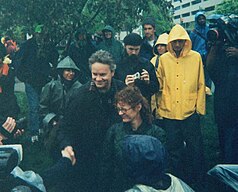Washington A16, 2000
| Washington A16, 2000 | |
|---|---|
| Part of the Anti-globalization movement | |
| Date | April 15–16, 2000 |
| Location | |
| Casualties | |
| Arrested | More than 678 |

Washington A16, 2000 was a series of protests in Washington, D.C. against the International Monetary Fund and the World Bank, that occurred in April 2000.[1][2] The annual IMF and World Bank meetings were the scene for follow-on protests of the 1999 WTO protests. In April 2000, between 10,000 and 15,000[3] protesters demonstrated at the IMF, and World Bank meeting (official numbers are not tallied).[4][5]
Planning[edit]
The International Forum on Globalization held non-violent civil disobedience training at Foundry United Methodist Church.[6] The Convergence Center at 1328 Florida Avenue was an activists’ meeting hall where the nonviolence training and prop making occurred (such as signs and puppets).[7] The protests were planned for April 16 and 17, concurrent dates as the planned meetings between the World Bank and International Monetary Fund.[8] Many of the protesters wanted to see accountability put in place for the globalization process.[9]
The United Steelworkers of America president George Becker was a participant at the protest, alongside environmental activists Julia Butterfly Hill and Mike Roselle.[10]
April 15, 2000[edit]

On April 15 the Washington D.C. Police preemptively raided (without a search warrant) the Convergence Center, citing fire safety. This police action was cited as an 'unconstitutional raid' during the subsequent class action lawsuit.[7]
The day before the larger protest scheduled on April 16, a smaller group of protesters demonstration against the Prison-Industrial Complex in the District of Columbia.[7] Mass arrests were conducted; 678 people were arrested,[11] including bystanders, journalists and tourists when the police did a sweep of the block.[7] Majority of the arrests on April 15 occurred at 20th Street NW between I and K streets.[12] Three-time Pulitzer Prize winning, Washington Post photographer Carol Guzy was detained by police and arrested on April 15, and two journalists for the Associated Press also reported being struck by police with batons.[13]

These arrests on April 15 were accused of being false and later spurred a class action lawsuit called 'Becker, et al. v. District of Columbia, et al..'.[7]

April 16, 2000[edit]
On April 16 and 17 the demonstrations and street actions around the IMF that followed, the number of those arrested grew to 1,300 people.[11] Between April 15 and April 16th, more than 600 people had been arrested.[9]
Lawsuits[edit]

In June 2010, the class-action lawsuit for the April 15th events called Becker, et al. v. District of Columbia, et al were settled, with $13.7 million damages awarded.[14][15]
Other, similar lawsuits have stemmed from mass arrests in the District of Columbia in recent years.[15] In 2009, the city agreed to pay $8.25 million to almost 400 protesters and bystanders to end a class-action lawsuit over mass arrests in Pershing Park during 2002 World Bank protests, according to the Partnership for Civil Justice Fund, which also represented those plaintiffs.[15]
See also[edit]
References[edit]
- ^ Karon, Tony (2000-04-14). "The Story Behind the Washington Protests". Time. ISSN 0040-781X. Retrieved 2020-10-19.
- ^ Pooley, Eric (2000-04-24). "The IMF: Dr. Death?". Time. ISSN 0040-781X. Retrieved 2020-10-19.
- ^ "A16, Washington DC". Socialism Today. No. 47. May 2000.
- ^ Griswold, Deirdre (April 16, 2000). "In the streets around the IMF". Workers World. workers.org. Archived from the original on July 27, 2014. Retrieved September 12, 2014.
- ^ WARNER, MARGARET (April 14, 2000). "Protesting Globalism". KQED, PBS NewsHour. PBS NewsHour. Archived from the original on September 13, 2014. Retrieved September 12, 2014.
- ^ ""A Movement Begins: The Washington Protests Against IMF/World Bank", New Politics, Jesse Lemisch, vol. 8, no. 1, Summer 2000". Archived from the original on 2013-02-17. Retrieved 2017-07-24.
- ^ a b c d e "April 2000 IMF Mass False Arrests, Becker, et al. v. District of Columbia, et al". The Partnership for Civil Justice Fund. Retrieved September 12, 2014.
- ^ Suellentrop, Chris (2000-04-12). "The Battle of Washington.com". Slate Magazine. Retrieved 2020-10-19.
- ^ a b Sarkar, Rumu (2020-03-26). International Development Law: Rule of Law, Human Rights & Global Finance. Springer Nature. pp. 79–80. ISBN 978-3-030-40071-2.
- ^ Lindsey, Daryl (2000-04-18). "Labor Meets the Granola Crunchers". Salon. Associated Press. Retrieved 2020-11-13.
- ^ a b Sarah Sloan (May 4, 2000). "Broad condemnation of police repression". Workers World. Archived from the original on August 19, 2018. Retrieved January 14, 2010.
- ^ "Benjamin Becker et al. vs. District of Columbia et al. Transcript of Fairness Hearing" (PDF). justiceonline.org. June 30, 2010. Retrieved September 12, 2014.
- ^ "Reporters arrested covering violence in D.C., Miami, war in Chechnya - Reporters Committee for Freedom of the Press". 31 October 2011. Retrieved 24 February 2017.
- ^ Robert McCartney (January 7, 2010). "D.C. mass arrest settlement offers needed reminder of rights". The Washington Post.
- ^ a b c Maria Glod (July 1, 2010). "D.C. agrees to $13.7 million settlement in 2000 mass arrest". The Washington Post.
External links[edit]
- "Beyond Seattle ~ Focus on the International Monetary Fund & the World Bank teachin", International Forum on Globalization
- "In Protest of the IMF and World Bank", Philippe C. Larochelle
- "A 16 and Beyond", Hermes, May 2000, Adam Hurter Archived 2011-01-06 at the Wayback Machine
- "Labor meets the granola crunchers" interview with United Steelworkers boss George Becker about the A16 protests (April 18, 2000) from Salon.com
- Video: IMF/World Bank Protests (April 16, 2000) from CSPAN
